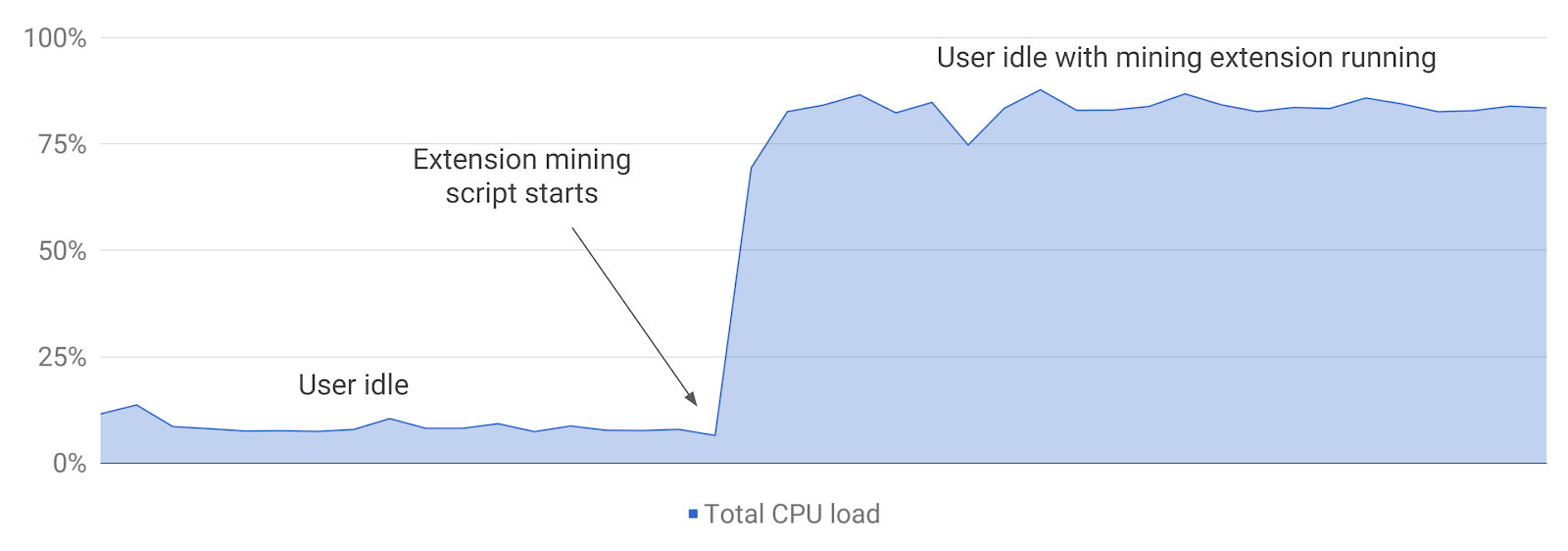Google Bans Crypto Mining Extensions From Chrome Web Store
After banning crypto ads last month, Google has now banned the crypto mining browser extensions from its Chrome web store. The tech giant won’t be accepting the crypto mining extensions anymore due to their non-compliance.
Eliminating cryptojacking: No more crypto mining extensions on chrome
Google, in its official announcement that was effective immediately from April 2, 2018, banned all the cryptocurrency mining browser extensions from its Chrome Web store and further won’t accept any new as well.
The announcement entitled “Protecting users from extension cryptojacking” states:
“As the extensions ecosystem continues to evolve, we remain focused on empowering developers to build innovative experiences while keeping our users as safe as possible.”

The tech giant further elaborated that it “will no longer accept extensions that mine cryptocurrency” and would start delisting the existing ones “in late June”. However, it does clarify that the blockchain related extensions whose purpose is not mining will be allowed in its Web Store.
Previously, Google has permitted the Chrome mining extensions on the ground that they were only dedicated to mining and informed the users explicitly about their purpose. But, looks like the policy couldn’t keep the malicious miners away.
Increase in malicious extension & non-compliance
The developers have been concerned about the malicious mining extensions since last year, in October. The reason behind the ban was the majority of mining extensions’ failure to comply with the company’s policies.
The product manager of Google’s extensions platform, James Wagner stated:
“The key to maintaining a healthy extensions ecosystem is to keep the platform open and flexible. This empowers our developers to build creative and innovative customizations for Chrome browser users.”
It has been further stated that:
“Approximately 90% of all extensions with mining scripts that developers have attempted to upload to Chrome Web Store have failed to comply with these policies, and have been either rejected or removed from the store.”
In its blog post, the US tech giant also mentioned the increase in the number of malicious extensions:
“Over the past few months, there has been a rise in malicious extensions that appear to provide useful functionality on the surface, while embedding hidden cryptocurrency mining scripts that run in the background without the user’s consent.”
Google notes that Chrome’s developer capabilities have attracted the malicious software developers which it now seeks to rectify:
“This policy is another step forward in ensuring that Chrome users can enjoy the benefits of extensions without exposing themselves to hidden risks.”
Well. there’s that, now, do you think Google will follow the same policies for its video platform YouTube? Which other big companies do you think will be the next to put the crypto bans? Let us know below in the comment section!
Play 10,000+ Casino Games at BC Game with Ease
- Instant Deposits And Withdrawals
- Crypto Casino And Sports Betting
- Exclusive Bonuses And Rewards

- Crypto Market Bill Hits New Deadlock as Banks Reject White House Deal
- Why Experts Are Warning Bitcoin Rally Could Be A “Dead Cat Bounce”
- BTC and Gold Price Bounce as Trump Admin Brokers US-Venezuela 1000 Kg Gold Deal
- SEC Advances Major Crypto Securities Plan to White House for Approval
- Peter Brandt Flips Bullish, Predicts Bitcoin Rally As Price Holds Above $70k
- XRP Price As Bitcoin Reclaims $74K- Is $5 Next?
- Dogecoin Price Outlook as BTC Recovers Above $73,000
- XRP Price Prediction as Iran-U.S. Peace Talks Trigger a Crypto Rally
- COIN Stock Analysis as Bitcoin Retests $72k Ahead of February NFP Data
- Robinhood Stock Price Prediction As Cathie Wood Buys $12M Dip in Bold ARK Move
- Bitcoin Price At Risk? Professor Who Predicted US-Iran War Says America Could Lose

 Buy $GGs
Buy $GGs

















